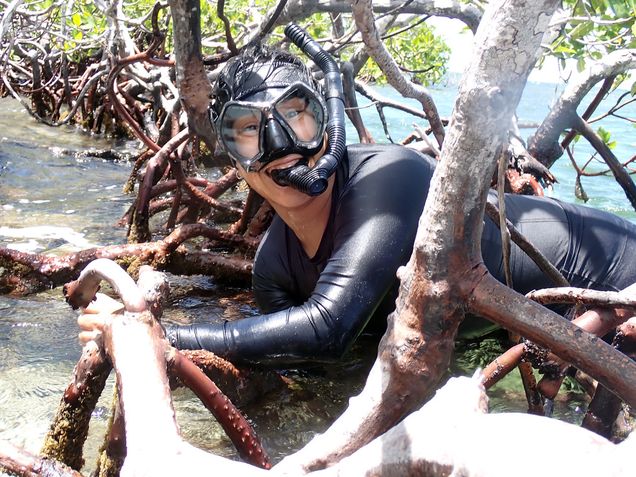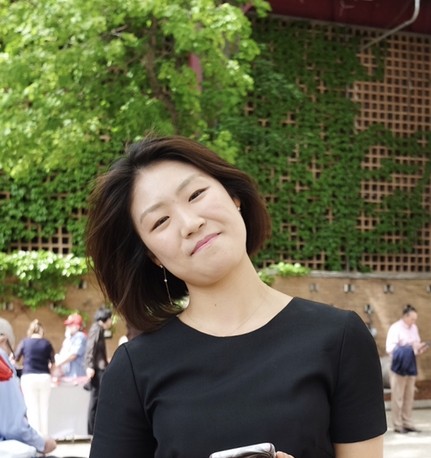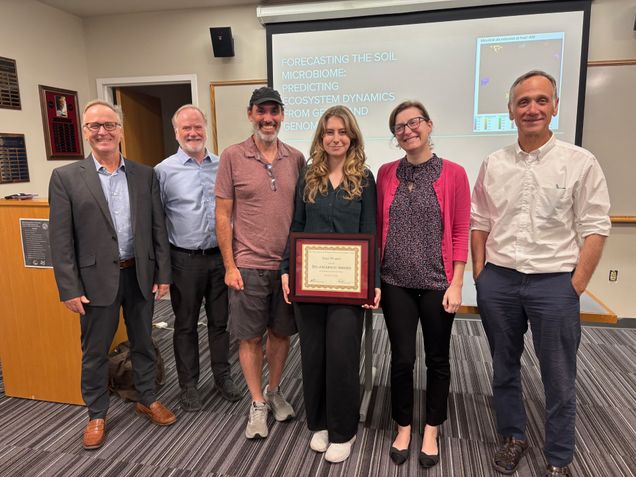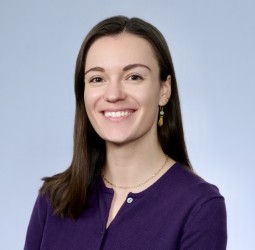Sabrina Samad Shoily Receives AAUW Fellowship

Biology PhD student Sabrina Samad Shoily of the Garcia-Marcos Lab recently received an International Fellowship from the American Association of University Women (AAUW). This fellowship promotes education and equity for women by investing in international applicants who will be pursuing postgraduate studies or research in the U.S., with the intention of applying their expertise, professional skills, and leadership in the context of their home countries.
Sabrina's research focuses on developing biosensors for detecting G protein-coupled receptor (GPCR)-G protein activity with high fidelity. She will study cellular signaling made by receptors that regulate women’s health by using genetically-modified mice and high precision biosensors in relevant cellular systems. The approach has the potential to lead to developing more precise and effective therapies for hormone-related health issues in women. Her long-term aim is to lead a team of academic researchers focused on cellular signaling and to prepare future scientists through training and mentorship.
Congratulations, Sabrina!
Mu-Han Chen and Ninon Martinez Awarded Graduate Research Fellowships by the International Coral Reef Society
PhD student Mu-Han Chen of the Davies Lab and PhD student Ninon Martinez of the Finnerty Lab were both recently awarded Graduate Research Fellowships by the International Coral Reef Society. This award provides funding to aid in the cost of research.
 Mu-Han studies how diel thermal variability (DTV) influences energy allocation in the Caribbean coral Siderastrea siderea. Building on her group’s year-long transplant experiments in the Bocas del Toro Reef Complex (BTRC), Panamá, she will compare skeletal growth and fecundity between low- and high-DTV reefs to identify trade-offs between coral growth and reproduction. Combined with physiological and gene expression data, her work will provide a comprehensive view of how environmental variability shapes coral fitness and resilience in a warming ocean. Mu-Han studies how diel thermal variability (DTV) influences energy allocation in the Caribbean coral Siderastrea siderea. Building on her group’s year-long transplant experiments in the Bocas del Toro Reef Complex (BTRC), Panamá, she will compare skeletal growth and fecundity between low- and high-DTV reefs to identify trade-offs between coral growth and reproduction. Combined with physiological and gene expression data, her work will provide a comprehensive view of how environmental variability shapes coral fitness and resilience in a warming ocean. |
 Ninon will seek to understand how local adaptation of corals across different marine habitats may contribute to coral survival, offering critical insights into the potential for coral populations to persist in a changing world. Ninon will seek to understand how local adaptation of corals across different marine habitats may contribute to coral survival, offering critical insights into the potential for coral populations to persist in a changing world. |
Congratulations, Mu-Han and Ninon!
So Young Bae Receives Invitation and Award to Speak at the American Crystallographic Association in Chicago

MCBB PhD student So Young Bae of the Tolan Lab received a Travel Award to present her research at the 2025 American Crystallographic Association (ACA) Annual Meeting. Her work was selected for both a 30-minute oral presentation and a poster presentation, and marked a notable achievement in the field of structural biology of ketohexokinase.
So Young delivered her oral presentation in this highly competitive “Cool Structures” session on Tuesday, July 22, titled, “Dual Substrate Binding Stabilizes the Catalytic State in Ketohexokinase.” Her research demonstrated that the enzyme ketohexokinase (KHK), essential in fructose metabolism, reaches its active form only when both ATP and fructose are bound—supporting a dual-substrate induced-fit mechanism. These findings have implications for understanding and potentially targeting metabolic disorders such as Type-2 diabetes, obesity, and non-alcoholic fatty liver disease.
In her poster presentation, “Structural Insights into E. coli Fructose-1-Phosphate Kinase Reveal Evolutionary Divergence within the PfkB Family,” So Young shared a high-resolution crystal structure of the bacterial enzyme from the FruK gene. Her analysis shed light on how bacterial sugar kinases differ structurally and functionally from their human counterparts.
So Young's research was conducted under the mentorship of Dr. Dean R. Tolan and Dr. Karen N. Allen and supported by NIH and Series-A funding from a small pharmaceutical company, exemplifying the departments’ strengths in interdisciplinary and translational structural biology.
Congratulations, So Young!
Jared Tague Receives 2025 Master’s Research Award

Jared Tague of the Ho-Beffert Lab is this year's recipient of the Master’s Research Award. This award provides a one-semester Research Assistantship to a continuing Biology MS student who stands out in their field of research.
Jared studies the molecular mechanisms of reelin signaling and its implications in brain development and Alzheimer’s disease. His research focuses on creating a robust purification process for reelin and one of its receptors, APOER2. Once isolated, he will be able to better investigate their biochemical interactions and structural features using binding assays and cryo-electron microscopy. Jared received his BS from Umass Lowell and then worked at Biogen where he gathered experience in neurodegenerative disease therapeutics development and protein biochemistry. Outside of the lab, he enjoys swimming at Crystal Lake, bar trivia, book club, and spending time with his friends and his cat.
Congratulations, Jared!
Zoey Werbin Receives 2025 Belamarich Award

Dr. Zoey Werbin of the Bhatnagar and Dietze Labs was selected as the winner of the 2025 Belamarich Award for her doctoral dissertation in Biology titled “Forecasting the Soil Microbiome.” The selection committee was impressed by Zoey’s ability to quickly and effectively adapt bioinformatics tools to predict the distribution of microbial populations, and implement new methods for metagenomic analyses. The committee also appreciated the fact that Zoey’s tools and databases will be broadly useful to the wider research community, and her willingness to lend her skills to the projects of other lab members. More information about her research is below.
Zoey studied the ecology of the soil microbiome, using tools from bioinformatics, Bayesian statistics, and synthetic biology. She developed short-term microbial abundance forecasts at a continental scale, as well as fine-scale predictions of soil nutrient cycling. She's interested in using the power of microbial communities to solve the biggest problems facing humans and our planet. Her graduate work was funded by a Graduate Research Fellowship from the National Science Foundation, as well as a Microbiome Fellowship from the Boston University Microbiome Initiative.
As in previous years, there will be a Belamarich Award Night to celebrate our award winner. The night includes a seminar given by the awardee, a brief ceremony, and a reception. The Seminar will be held on Monday, October 6th at 4:00pm in BRB 113. The Award Ceremony will take place immediately after, with the Reception following down the hall in BRB 117, from ~5:00pm-6:30pm. We are honored to have the Belamarich family joining us again to celebrate this year’s award winner.
We look forward to seeing everyone at Belamarich Award Night!
More about the Belamarich Award:
Frank A. Belamarich joined the BU Biology Department in 1963 as an assistant professor where he quickly gained international recognition for his research in the field of comparative hemostasis, the process of blood clotting. Throughout his tenure at BU he was a popular teacher of a core course in cell biology which he developed. Belamarich maintained research laboratories in Boston as well as at the Marine Biological Laboratory at Woods Hole in Falmouth, MA as part of the BU Marine Program.
Congratulations, Zoey!

Ritika Sibal Receives 2025 Denton Award

Ritika Sibal of the Knott Lab was selected as the winner of the 2025 Denton Award for her master’s research thesis in Biology titled “Investigating Positional Behavior and Locomotion of Wild Bornean Orangutans Using Behavioral Sampling and Computer Vision.” This award is given for excellence in scholarship and research accomplishment during a master’s thesis under the mentorship of a faculty member of the Department of Biology.
Ritika earned her B.S. in Computer Engineering from the University of Michigan in 2020. She is passionate about leveraging technology to advance animal behavior research. Prior to admission in the Master’s program, Ritika volunteered at Alma Bonita Animal Rescue, where she applied her engineering skills to design and build a custom 3D-printed wheelchair for a young goat. For her Master’s thesis, Ritika developed a novel computer vision model to non-invasively track joint positions in wild orangutans. She applied this model to investigate terrestrial gait in Bornean orangutans, analyzing differences across natural substrates and in comparison with chimpanzees. She also explored bipedalism and downclimbing in both species, offering insights into great ape locomotion in the wild. Her thesis provides a novel and robust methodology to non-invasively investigate animal behavior in situ.
Congratulations, Ritika!
JK Da-Anoy Receives 2025 Economakis Award
J K Da-Anoy of the Davies Lab received the 2025 Alistair Economakis Award in Marine Science. This award provides support for graduate students conducting research in marine science with a focus on research related to ecology, evolution, or behavior.
K Da-Anoy of the Davies Lab received the 2025 Alistair Economakis Award in Marine Science. This award provides support for graduate students conducting research in marine science with a focus on research related to ecology, evolution, or behavior.
JK is a Filipino PhD student fascinated by evolution of metazoan complexity. He received his Master’s degree at the University of the Philippines, exploring stress response and evolutionary neurobiology under Dr. Cecilia Conaco’s supervision.
Congratulations, JK!
Isabel Novick Receives 2025 Thomas H. Kunz Award
 Isabel Novick, a Biology PhD student in the Mullen Lab, received the 2025 Thomas H. Kunz Award. The Kunz Award recognizes and celebrates exemplary contributions by an early or mid-career scientist to the study of bats, including measurable impacts on bat research and/or conservation, student mentoring, public education, and collaborations.
Isabel Novick, a Biology PhD student in the Mullen Lab, received the 2025 Thomas H. Kunz Award. The Kunz Award recognizes and celebrates exemplary contributions by an early or mid-career scientist to the study of bats, including measurable impacts on bat research and/or conservation, student mentoring, public education, and collaborations.
Isabel studies the phylogenetics, biogeography, and speciation of fungus moths (Tineidae family), specifically the widespread pest species, the webbing-clothes moth (Tineola bisselliella). She is most interested in the causes and consequences of synanthropic life-history evolution: how have these organisms colonized the anthropogenic environment?
This award provides support for Ecology, Behavior & Evolution (EBE) PhD candidates who have completed the qualifying exam, with a preference for those conducting field research in the award year. The award was established in 2015 in recognition and appreciation of Professor Thomas H. Kunz’s mentorship. His current and former graduate students established this award to serve as a lasting legacy of Tom’s contributions at BU and beyond. Learn more about Dr. Kunz and how you can support this award.
Congratulations, Isabel!
Corinne Vietorisz Receives 2025 AAUW American Dissertation Fellowship
 Biology PhD candidate Corinne Vietorisz of the Bhatnagar Lab recently received a 2025 American Dissertation Fellowship from the American Association of University Women (AAUW). This Fellowship offsets scholars’ expenses during their final year of dissertation writing and is open to women in all fields of study, though those engaged in science, technology, engineering, and math fields, or those researching gender issues, are especially encouraged to apply.
Biology PhD candidate Corinne Vietorisz of the Bhatnagar Lab recently received a 2025 American Dissertation Fellowship from the American Association of University Women (AAUW). This Fellowship offsets scholars’ expenses during their final year of dissertation writing and is open to women in all fields of study, though those engaged in science, technology, engineering, and math fields, or those researching gender issues, are especially encouraged to apply.
The goal of Corinne's research is to understand the roles that different groups of fungi and bacteria play in soil nutrient cycling, and their contributions relative to plant and abiotic factors. Using high-throughput DNA sequencing, meta-transcriptomics, and biogeochemistry methods, she examines how microbial community composition and gene expression are linked to soil net ammonium, nitrate, and phosphate mineralization in forests. Her dissertation gives new insights into how microbial communities impact soil nitrogen and phosphorus cycling, which is necessary to understand how nutrient availability, plant growth, and carbon cycling will respond to our rapidly changing world.
Congratulations, Corinne!
Emerson Conrad-Rooney Receives the AAAS 2025 Student E-Poster Competition in the Environment and Ecology Award
 Biology PhD student Emerson Conrad-Rooney of the Templer Lab received the American Association for the Advancement of Science (AAAS) 2025 Student E-Poster Competition in the Environment and Ecology award. The AAAS showcases undergraduate and graduate students' innovative research and communication skills and highlights the importance of making science accessible and engaging for all.
Biology PhD student Emerson Conrad-Rooney of the Templer Lab received the American Association for the Advancement of Science (AAAS) 2025 Student E-Poster Competition in the Environment and Ecology award. The AAAS showcases undergraduate and graduate students' innovative research and communication skills and highlights the importance of making science accessible and engaging for all.
Emerson attended the AAAS Annual Meeting in Boston this February. There, they won first place in the AAAS 2025 Student E-Poster Competition in the Environment and Ecology category. Their poster was titled, “Effects of Growing Season Warming and Winter Freeze/Thaw Cycles on Tree Growth.”
They shared results from the Templer Lab’s decade-long Climate Change Across Seasons Experiment (CCASE) at the Hubbard Brook Experimental Forest in New Hampshire, an experiment that quantifies the combined effects of growing season warming and a smaller winter snowpack on temperate forest ecosystem processes. Emerson measured tree growth using tree cores and found that after a decade of treatments, growing season warming increases annual rates of tree growth for red maple (the most common species); however, winter soil freeze/thaw cycles counteract this effect.
Congratulations, Emerson!